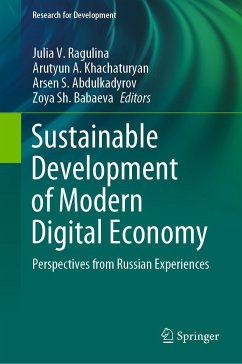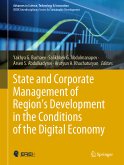Sustainable Development of Modern Digital Economy (eBook, PDF)
Perspectives from Russian Experiences
Redaktion: Ragulina, Julia V.; Babaeva, Zoya Sh.; Abdulkadyrov, Arsen S.; Khachaturyan, Arutyun A.
-49%11
97,95 €
192,59 €**
97,95 €
inkl. MwSt.
**Preis der gedruckten Ausgabe (Gebundenes Buch)
Sofort per Download lieferbar

49 °P sammeln
-49%11
97,95 €
192,59 €**
97,95 €
inkl. MwSt.
**Preis der gedruckten Ausgabe (Gebundenes Buch)
Sofort per Download lieferbar
Alle Infos zum eBook verschenken

49 °P sammeln
Als Download kaufen

192,59 €****
-49%11
97,95 €
inkl. MwSt.
**Preis der gedruckten Ausgabe (Gebundenes Buch)
Sofort per Download lieferbar

49 °P sammeln
Jetzt verschenken
Alle Infos zum eBook verschenken
192,59 €****
-49%11
97,95 €
inkl. MwSt.
**Preis der gedruckten Ausgabe (Gebundenes Buch)
Sofort per Download lieferbar
Alle Infos zum eBook verschenken

49 °P sammeln
Sustainable Development of Modern Digital Economy (eBook, PDF)
Perspectives from Russian Experiences
Redaktion: Ragulina, Julia V.; Babaeva, Zoya Sh.; Abdulkadyrov, Arsen S.; Khachaturyan, Arutyun A.
- Format: PDF
- Merkliste
- Auf die Merkliste
- Bewerten Bewerten
- Teilen
- Produkt teilen
- Produkterinnerung
- Produkterinnerung

Bitte loggen Sie sich zunächst in Ihr Kundenkonto ein oder registrieren Sie sich bei
bücher.de, um das eBook-Abo tolino select nutzen zu können.
Hier können Sie sich einloggen
Hier können Sie sich einloggen
Sie sind bereits eingeloggt. Klicken Sie auf 2. tolino select Abo, um fortzufahren.

Bitte loggen Sie sich zunächst in Ihr Kundenkonto ein oder registrieren Sie sich bei bücher.de, um das eBook-Abo tolino select nutzen zu können.
The digital economy is a new direction in which the modern global economic system is now heading. This book seeks to adapt the digital economy concept to the priorities of humanity, including the implementation of global development goals. The authors develop and substantiate scientific and methodological criteria for assessing the sustainability of the modern digital economy, and offer several concrete recommendations for improving the concept of the digital economy by incorporating global development goals.
- Geräte: PC
- ohne Kopierschutz
- eBook Hilfe
- Größe: 5.06MB
Andere Kunden interessierten sich auch für
![Business 4.0 as a Subject of the Digital Economy (eBook, PDF) Business 4.0 as a Subject of the Digital Economy (eBook, PDF)]() Business 4.0 as a Subject of the Digital Economy (eBook, PDF)137,95 €
Business 4.0 as a Subject of the Digital Economy (eBook, PDF)137,95 €- -30%11
![The Evolution of Sustainable Investments and Finance (eBook, PDF) The Evolution of Sustainable Investments and Finance (eBook, PDF)]() Francesco GangiThe Evolution of Sustainable Investments and Finance (eBook, PDF)97,95 €
Francesco GangiThe Evolution of Sustainable Investments and Finance (eBook, PDF)97,95 € ![State and Corporate Management of Region's Development in the Conditions of the Digital Economy (eBook, PDF) State and Corporate Management of Region's Development in the Conditions of the Digital Economy (eBook, PDF)]() State and Corporate Management of Region's Development in the Conditions of the Digital Economy (eBook, PDF)73,95 €
State and Corporate Management of Region's Development in the Conditions of the Digital Economy (eBook, PDF)73,95 €![Climate Change Adaptation, Governance and New Issues of Value (eBook, PDF) Climate Change Adaptation, Governance and New Issues of Value (eBook, PDF)]() Climate Change Adaptation, Governance and New Issues of Value (eBook, PDF)81,95 €
Climate Change Adaptation, Governance and New Issues of Value (eBook, PDF)81,95 €![Innovative Humanitarian Financing (eBook, PDF) Innovative Humanitarian Financing (eBook, PDF)]() Maram AhmedInnovative Humanitarian Financing (eBook, PDF)81,95 €
Maram AhmedInnovative Humanitarian Financing (eBook, PDF)81,95 €![The Palgrave Handbook of Africa's Economic Sectors (eBook, PDF) The Palgrave Handbook of Africa's Economic Sectors (eBook, PDF)]() The Palgrave Handbook of Africa's Economic Sectors (eBook, PDF)97,95 €
The Palgrave Handbook of Africa's Economic Sectors (eBook, PDF)97,95 €![ESG Management of the Development of the Green Economy in Central Asia (eBook, PDF) ESG Management of the Development of the Green Economy in Central Asia (eBook, PDF)]() ESG Management of the Development of the Green Economy in Central Asia (eBook, PDF)145,95 €
ESG Management of the Development of the Green Economy in Central Asia (eBook, PDF)145,95 €-
-
-
The digital economy is a new direction in which the modern global economic system is now heading. This book seeks to adapt the digital economy concept to the priorities of humanity, including the implementation of global development goals. The authors develop and substantiate scientific and methodological criteria for assessing the sustainability of the modern digital economy, and offer several concrete recommendations for improving the concept of the digital economy by incorporating global development goals.
Dieser Download kann aus rechtlichen Gründen nur mit Rechnungsadresse in A, B, BG, CY, CZ, D, DK, EW, E, FIN, F, GR, HR, H, IRL, I, LT, L, LR, M, NL, PL, P, R, S, SLO, SK ausgeliefert werden.
Produktdetails
- Produktdetails
- Verlag: Springer International Publishing
- Seitenzahl: 368
- Erscheinungstermin: 30. Juni 2021
- Englisch
- ISBN-13: 9783030701949
- Artikelnr.: 62173083
- Verlag: Springer International Publishing
- Seitenzahl: 368
- Erscheinungstermin: 30. Juni 2021
- Englisch
- ISBN-13: 9783030701949
- Artikelnr.: 62173083
- Herstellerkennzeichnung Die Herstellerinformationen sind derzeit nicht verfügbar.
Julia V. Ragulina, professor, Head of the Chair of compliance and controlling at RUDN University (Russian Federation). She is the honored worker of science and technology of the Russian Federation and the honored worker of higher professional education. She is the author of more than 200 publications and a range of monographs on state control and audit, state and municipal management, and economics of municipal entities (including monographs with co-authors from Harvard University, USA). Arutyun A. Khachaturyan, professor at Market Economy Institute of the Russian Academy of Sciences (Russian Federation). He is the honored scientist of the Russian Federation and the honored worker of higher professional education of the Russian Federation. He is the author of more than 170 scientific works and monographs on business modeling of the processes of hi-tech companies in the conditions of economy's digitization, economic security, military economy, and economic security. ArsenS. Abdulkadyrov, associate professor, chief scientific officer at Research Institute of Management, Economics, Politics, and Sociology of Dagestan State University of National Economy (Russian Federation). He is the author of more than 100 scientific works, including 5 monographs. His scientific interests include economics of hi-tech production, digital economy, analysis and modeling of economic processes in the fuel and energy complex, and economic and national security. Zoya Sh. Babaeva, associate professor at Dagestan State University of National Economy in Economics (Russian Federation). She is the author of more than 110 scientific works, including 3 monographs. Her scientific interests include financial accounting and analysis and audit. She is a member of editorial boards of several leading economic journals of Russia.
Introduction.- Part 1. The conceptual foundations of sustainable development of economy in the conditions of digitization.- Chapter 1. The modern scientific paradigm of sustainable development of economy and specifics of its treatment in the conditions of digitization.- Chapter 2. Contradiction of sustainable development of economy in the conditions of digitization: flexibility and innovations vs. safety and stability.- Chapter 3. Priorities of sustainable development in the conditions of digitization: economic planning, human development, and ecological safety.- Chapter 4. Strategic foundations of sustainable development of a digital company.- Chapter 5. The concept of state regulation of digital economy in the interests of sustainable development.- Part 2. Directions of provision of sustainable development of the digital economy.- Chapter 6. Managing the economic growth in the interests of sustainable development of the digital economy.- Chapter 7. Perspectives of provision of sustainability of territories of rapid socio-economic development based on digitization.- Chapter 8. Eco-oriented economy as a tool of increasing the quality of life: possibilities and perspectives in the conditions of digitization.- Chapter 9. Formation of an effective system of expanded reproduction in agriculture as a necessary condition of sustainable development of the agrarian sector of economy.- Chapter 10. Modernization as a condition of sustainable development of the digital economy.- Part 3. Scientific and methodological provision of sustainable development of the digital economy.- Chapter 11. Methodology of the indicative evaluation of sustainability of the digital economy development.- Chapter 12. Methodological approach to evaluating the effectiveness of managing the sustainable development of the digital economy.- Chapter 13. Investment attractiveness as the indicator of sustainability of territory's development in the conditions of digitization.- Chapter 14. The system of factors of sustainable development of the digital economy: globalization, diversification and security.- Chapter 15. The tax and budget aspect of provision of sustainable development of region's digital economy.- Part 4. Specifics of sustainable development of various types of socio-economic systems in the conditions of digitization.- Chapter 16. Sustainable development of region and the phenomenon of the crisis state of sustainability of regional economy: specifics in the conditions of digitization.- Chapter 17. Models of sustainable development of urban territories in the conditions of digitization.- Chapter 18. The economic mechanism of sustainable development of rural territories in the conditions of digitization.- Chapter 19. Sustainable development of industrial spheres of a region: the key factors and possibilities of stimulation in the conditions of digitization.- Chapter 20. The problem of provision of sustainable development of the digital company in the conditions of economic sanctions.- Part 5. Digital tools of provision of economy's sustainable development.- Chapter 21. The influence of digitization on sustainability of development of economy in developed and developing countries.- Chapter 22. The institutional basis of sustainable development of the digital economy.- Chapter 23. Innovative development of the digital economy: a view from the positions of sustainability.- Chapter 24. State management of sustainable development of with the help of Big Data: modern opportunities and future perspectives.- Chapter 25. The strategic plan of provision of sustainable development of the digital economy.- Conclusions.
Introduction.- Part 1. The conceptual foundations of sustainable development of economy in the conditions of digitization.- Chapter 1. The modern scientific paradigm of sustainable development of economy and specifics of its treatment in the conditions of digitization.- Chapter 2. Contradiction of sustainable development of economy in the conditions of digitization: flexibility and innovations vs. safety and stability.- Chapter 3. Priorities of sustainable development in the conditions of digitization: economic planning, human development, and ecological safety.- Chapter 4. Strategic foundations of sustainable development of a digital company.- Chapter 5. The concept of state regulation of digital economy in the interests of sustainable development.- Part 2. Directions of provision of sustainable development of the digital economy.- Chapter 6. Managing the economic growth in the interests of sustainable development of the digital economy.- Chapter 7. Perspectives of provision of sustainability of territories of rapid socio-economic development based on digitization.- Chapter 8. Eco-oriented economy as a tool of increasing the quality of life: possibilities and perspectives in the conditions of digitization.- Chapter 9. Formation of an effective system of expanded reproduction in agriculture as a necessary condition of sustainable development of the agrarian sector of economy.- Chapter 10. Modernization as a condition of sustainable development of the digital economy.- Part 3. Scientific and methodological provision of sustainable development of the digital economy.- Chapter 11. Methodology of the indicative evaluation of sustainability of the digital economy development.- Chapter 12. Methodological approach to evaluating the effectiveness of managing the sustainable development of the digital economy.- Chapter 13. Investment attractiveness as the indicator of sustainability of territory's development in the conditions of digitization.- Chapter 14. The system of factors of sustainable development of the digital economy: globalization, diversification and security.- Chapter 15. The tax and budget aspect of provision of sustainable development of region's digital economy.- Part 4. Specifics of sustainable development of various types of socio-economic systems in the conditions of digitization.- Chapter 16. Sustainable development of region and the phenomenon of the crisis state of sustainability of regional economy: specifics in the conditions of digitization.- Chapter 17. Models of sustainable development of urban territories in the conditions of digitization.- Chapter 18. The economic mechanism of sustainable development of rural territories in the conditions of digitization.- Chapter 19. Sustainable development of industrial spheres of a region: the key factors and possibilities of stimulation in the conditions of digitization.- Chapter 20. The problem of provision of sustainable development of the digital company in the conditions of economic sanctions.- Part 5. Digital tools of provision of economy's sustainable development.- Chapter 21. The influence of digitization on sustainability of development of economy in developed and developing countries.- Chapter 22. The institutional basis of sustainable development of the digital economy.- Chapter 23. Innovative development of the digital economy: a view from the positions of sustainability.- Chapter 24. State management of sustainable development of with the help of Big Data: modern opportunities and future perspectives.- Chapter 25. The strategic plan of provision of sustainable development of the digital economy.- Conclusions.







